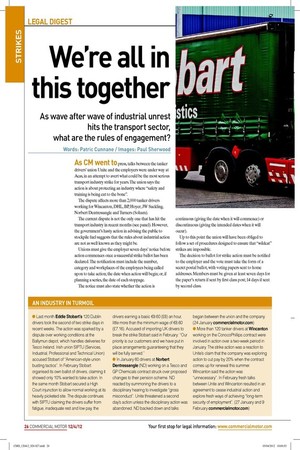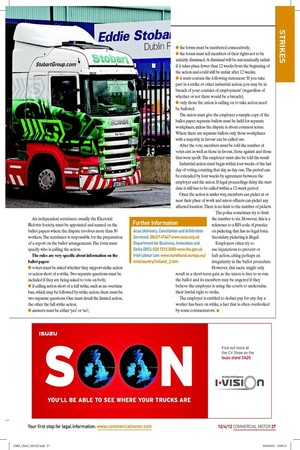We’re all in this together
Page 19

Page 20

If you've noticed an error in this article please click here to report it so we can fix it.
As wave after wave of industrial unrest hits the transport sector, what are the rules of engagement?
Words: Patric Cunnane / Images: Paul Sherwood As CM went to press, talks between the tanker drivers’ union Unite and the employers were under way at Acas, in an attempt to avert what could be the most serious transport industry strike for years. The union says the action is about protecting an industry where “safety and training is being cut to the bone”.
The dispute affects more than 2,000 tanker drivers working for Wincanton, DHL, BP, Hoyer, JW Suckling, Norbert Dentressangle and Turners (Soham).
The current dispute is not the only one that has hit the transport industry in recent months (see panel). However, the government’s hasty action in advising the public to stockpile fuel suggests that the rules about industrial action are not as well known as they might be.
Unions must give the employer seven days’ notice before action commences once a successful strike ballot has been declared. The notiication must include the number, category and workplaces of the employees being called upon to take action; the date when action will begin; or, if planning a series, the date of each stoppage.
The notice must also state whether the action is continuous (giving the date when it will commence) or discontinuous (giving the intended dates when it will occur).
Up to this point the union will have been obliged to follow a set of procedures designed to ensure that “wildcat” strikes are impossible.
The decision to ballot for strike action must be notiied to the employer and the vote must take the form of a secret postal ballot, with voting papers sent to home addresses. Members must be given at least seven days for the paper’s return if sent by irst class post; 14 days if sent by second class. An independent scrutineer, usually the Electoral Reform Society, must be appointed and named on the ballot papers where the dispute involves more than 50 workers. The scrutineer is responsible for the preparation of a report on the ballot arrangements. The form must specify who is calling the action.
The rules are very speciic about information on the ballot paper: • voters must be asked whether they support strike action or action short of a strike. Two separate questions must be included if they are being asked to vote on both; • if calling action short of a full strike, such as an overtime ban, which may be followed by strike action, there must be two separate questions. One must detail the limited action, the other the full strike action; • answers must be either ‘yes’ or ‘no’; • the forms must be numbered consecutively; • the forms must tell members of their rights not to be unfairly dismissed. A dismissal will be automatically unfair if it takes place fewer than 12 weeks from the beginning of the action and could still be unfair after 12 weeks; • it must contain the following statement: ‘If you take part in a strike or other industrial action, you may be in breach of your contract of employment’ (regardless of whether or not there would be a breach); • only those the union is calling on to take action need be balloted.
The union must give the employer a sample copy of the ballot paper; separate ballots must be held for separate workplaces, unless the dispute is about common terms. Where there are separate ballots only those workplaces with a majority in favour can be called out.
After the vote, members must be told the number of votes cast as well as those in favour, those against and those that were spoilt. The employer must also be told the result.
Industrial action must begin within four weeks of the last day of voting, counting that day as day one. The period can be extended by four weeks by agreement between the employer and the union. If legal proceedings delay the start date it still has to be called within a 12-week period.
Once the action is under way, members can picket at or near their place of work and union oficers can picket any affected location. There is no limit to the number of pickets.
The police sometimes try to limit the number to six. However, this is a reference to a BIS code of practice on picketing that has no legal force. Secondary picketing is illegal.
Employers often try to use injunctions to prevent or halt action, citing perhaps an irregularity in the ballot procedure. However, this tactic might only result in a short-term gain as the union is free to re-run the ballot and its members may be angered if they believe the employer is using the courts to undermine their lawful right to strike.
The employer is entitled to deduct pay for any day a worker has been on strike, a fact that is often overlooked by some commentators. n
Further Information
Acas (Advisory, Conciliation and Arbitration Services). 08457 47447 www.acas.org.uk Department for Business, Innovation and Skills (BIS): 020 7215 5000 www.bis.gov.uk Irish labour law: www.eurofound.europa.eu/ eiro/country/Ireland_2.htm
AN INDUSTRY IN TURMOIL
• Last month Eddie Stobart’s 120 Dublin drivers took the second of two strike days in recent weeks. The action was sparked by a dispute over working conditions at the Ballymun depot, which handles deliveries for Tesco Ireland. Irish union SIPTU (Services, Industrial, Professional and Technical Union) accused Stobart of “American-style union busting tactics”. In February Stobart organised its own ballot of drivers, claiming it showed only 10% wanted to take action. In the same month Stobart secured a High Court injunction to allow normal working at its heavily picketed site. The dispute continues with SIPTU claiming the drivers suffer from fatigue, inadequate rest and low pay, the drivers earning a basic €9.60 (£8) an hour, little more than the minimum wage of €8.60 (£7.16). Accused of importing UK drivers to break the strike Stobart said in February: “Our priority is our customers and we have put in place arrangements guaranteeing that they will be fully served.” • In January 60 drivers at Norbert Dentressangle (ND) working on a Tesco and GP Chemicals contract struck over proposed changes to their pension scheme. ND reacted by summoning the drivers to a disciplinary hearing to investigate “gross misconduct”. Unite threatened a second day’s action unless the disciplinary action was abandoned. ND backed down and talks
began between the union and the company. (24 January commercialmotor.com) • More than 120 tanker drivers at Wincanton working on the ConocoPhillips contract were involved in action over a two-week period in January. The strike action was a reaction to Unite’s claim that the company was exploring action to cut pay by 20% when the contract comes up for renewal this summer. Wincanton said the action was “unnecessary”. In February fresh talks between Unite and Wincanton resulted in an agreement to cease industrial action and explore fresh ways of achieving “long-term security of employment”. (27 January and 9 February commercialmotor.com)











































